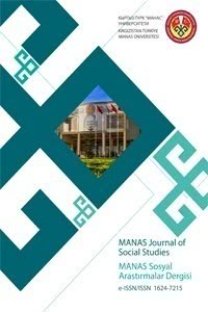Pay Piyasası Getirilerini Etkileyen Makroekonomik Faktörler: Avrasya Ülkeleri Borsa Endeksleri Üzerine Bir Analiz
Macroeconomic Factors Affecting Stock Market Returns: An Analysis on the Stock Exchange Indices of the Eurasian Countries
___
- Albayrak, S. (2005). Çoklu Doğrusal Bağlantı Hali̇nde Enküçük Kareler Tekniğinin Alternatifi Yanlı Tahmin Teknikleri ve Bir Uygulama. ZKÜ Sosyal Bilimler Dergisi, 1(1), 106–125. Erişim adresi: https://www.acarindex.com/
- Bal, H. ve Özdemir, P. (2017). Kurumlar ve Ekonomik Gelişme: Panel Veri Analizi ile Bir Değerlendirme. Gazi Üniversitesi Sosyal Bilimler Dergisi, 4(9), 80–104. Erişim adresi: https://dergipark.org.tr/tr/download/article- file/307851
- Bhatti, R. ve Pak, O. (2013). Stock Return and Inflation in Kazakhstan, Russia and Ukraine. International Journal of Economcis and Finance Studies, 5(1), 258–267. Erişim adresi: https://www.sobiad.org/eJOURNALS/journal_IJEF/archieves/2013_1/Razzaque- Bhatti.pdf
- Bhuiyan, E. M. ve Chowdhury, M. (2020). Macroeconomic Variables and Stock Market Indices: Asymmetric Dynamics in the US and Canada. Quarterly Review of Economics and Finance, 77(2), 62–74. https://doi.org/10.1016/j.qref.2019.10.005.
- Chandrashekar, R., Sakthivel, P., Sampath, T. ve Chittedi, K. (2018). Macroeconomic Variables and Stock Prices in Emerging Economies: a Panel Analysis. Theoretical and Applied Economics, 15(3), 91–100. Erişim adresi: https://dergipark.org.tr/tr/
- Chang, B. H., Meo, M. S., Syed, Q. R. ve Abro, Z. (2019). Dynamic Analysis of the Relationship between Stock Prices and Macroeconomic Variables: an Empirical Study of Pakistan Stock Exchange. South Asian Journal of Business Studies, 8(3), 229–245. https://doi.org/10.1108/SAJBS-06-2018-0062.
- Çemrek, F. ve Burhan, E. (2014). Petrol Tüketiminin Ekonomik Büyüme Üzerindeki Etkisinin Panel Veri Analizi İle İncelenmesi : Avrupa Birliği Ülkeleri Ve Türkiye Örneği. Uluslararası Alanya İşletme Fakültesi Dergisi, 6(3), 47–58. Erişim adresi: https://dergipark.org.tr/tr/download/article-file/201799
- Debedek, E.ve Meriç, M. (2015). Avrupa Bi̇rli̇ği̇ Ülkeleri̇nde Savunma Harcamalarını Beli̇rleyen Ekonomi̇k ve Sosyal Faktörler: Panel Veri Anali̇zi̇. Sayıştay Dergisi, 97(6), 89–104. Erişim adresi: https://dergipark.org.tr/tr/
- Epaphra, M. ve Salema, E. (2018). the Impact of Macroeconomic Variables on Stock Prices in Tanzania. Journal of Economics Library, 5(1), 12–41. Erişim adresi: http://www.kspjournals.org/
- Gay, R. (2008). Effect of Macroeconomic Variables on Stock Market Returns for Four Emerging Economies: Brazil, Russia, India, and China. International Business & Economics Research Journal, 7(3), 1–8. https://doi.org/10.1080/00036840600820663
- Gnahe, F. (2020). Do Macroeconomic Variables Impact Stock Market Returns? Evidence from Kazakhstan. Global Journal of Business, Economics and Management: Current Issues, 11(3), 255–274. Erişim adresi: https://www.ceeol.com/search/article-detail?id=968709
- Gopinathan, R. ve Durai, S. R. S. (2019). Stock Market and Macroeconomic Variables: New Evidence from India. Financial Innovation, 5(1), 1–17. https://doi.org/10.1186/s40854-019-0145-1.
- Gujarati, D. N. ve Porter, Da. C. (2012). Temel Ekonometri (1). Literatür Yayıncılık.
- Iqmal, F. M. ve Putra, I. G. S. (2020). Macroeconomic Factors and Influence on Stock Return That Impact the Corporate Values. International Journal of Finance & Banking Studies, 9(1), 68–75. https://doi.org/10.20525/ijfbs.v9i1.667.
- Jamaludin, N., Ismail, S. ve Manaf, S. A. (2017). Macroeconomic Variables and Stock Market Returns: Panel Analysis from Selected ASEAN Countries. International Journal of Economics and Financial Issues, 7(1), 37–45. Erişim adresi: https://econjournals.com/index.php
- Karki, D. E. (2018). Stock Market Responses to Macroeconomic Dynamics: Testing for Long-Run Equilibrium in Nepal. Pravaha Journal, 24(1), 64–82. https://doi.org/10.3126/pravaha.v24i1.20227.
- Khan, J. ve Khan, I. (2018). The Impact of Macroeconomic Variables on Stock Prices: A Case Study of Karachi Stock Exchange. Business and Economics Journal, 09(03), 2014–2015. https://doi.org/10.4172/2151- 6219.1000365.
- Kocabıyık, T. ve Fattah, A. (2020). Makroekonomik Değişkenlerin Borsa Endeksleri Üzerine Etkisi: Türkiye ve ABD Karşılaştırması. Finansal Araştırmalar ve Çalışmalar Dergisi, 12(22), 116–151. https://doi.org/10.14784/marufacd.691108
- Lee, J. W. ve Brahmasrene, T. (2018). an Exploration of Dynamical Relationships between Macroeconomic Variables and Stock Prices in Korea. Journal of Asian Finance, Economics and Business, 5(3), 7–17. https://doi.org/10.13106/jafeb.2018.vol5.no3.7.
- Ndlovu, B., Faisa, F., Resatoglu, G. ve Tursoy, T. (2018). The Impact of Macroeconomic Variables on Stock Returns: a Case of the Johannesburg Stock Exchange. Romanian Statistical Review, 6(2), 87–104. Erişim adresi: https://www.revistadestatistica.ro/
- Nti, I. K., Adekoya, A. F. ve Weyori, B. A. (2019). Random Forest Based Feature Selection of Macroeconomic Variables for Stock Market Prediction. American Journal of Applied Sciences, 16(7), 200–212. https://doi.org/10.3844/ajassp.2019.200.212.
- Oskenbayev, Y., Yılmaz, M. ve Chagirov, D. (2011). The Impact of Macroeconomic Indicators on Stock Exchange Performance in Kazakhstan. African Journal of Business Management, 5(7), 2985–2991. https://doi.org/10.5897/AJBM10.1480
- Pesaran, M. H. (2015). Time Series and Panel Data Econometrics. Oxford University Press.
- Setiawan, S. A. (2020). Does Macroeconomic Condition Matter for Stock Market ? Evidence of Indonesia Stock Market Performance for 21 Years. The Indonesian Journal of Development Planning, IV(1), 27–39. Erişim adresi: https://journal.bappenas.go.id/index.php/jpp
- Syzdykova, A. (2018). Makroekonomik Değişkenler ve Hisse Senedi Piyasası İlişkisi : KASE Örneği. Çankırı Karatekin Üniversitesi Sosyal Bilimler Enstitüsü Dergisi, 8(2), 331–354. Erişim adresi: https://dergipark.org.tr/tr/download/article- file/611946
- Uzun, U. ve Güngör, B. (2017). Borsa Endeksleri ile Ülkelerin Seçilmiş Makroekonomik Göstergeleri Arasındaki İlişkinin Uluslararası Boyutta İncelenmesi̇. Abant İzzet Baysal Üniversitesi Sosyal Bilimler Enstitüsü Dergisi, 17(1), 1– 28. Erişim adresi: https://dergipark.org.tr/tr/download/article-file/533896
- Ünal, S. ve Karaş, G. (2021). Borsa ve Makroekonomik Faktörler Arasındaki Etkileşim: BIST100 Örneği. Yönetim ve Ekonomi, 28(1), 169–185. Erişim adresi: https://dergipark.org.tr/tr/download/article-file/1259116
- Vychytilová, J., Pavelková, D., Pham, H. ve Urbánek, T. (2019). Macroeconomic Factors Explaining Stock Volatility: Multi-country Empirical Evidence from the Auto Industry. Economic Research-Ekonomska Istrazivanja, 32(1), 3327–3341. https://doi.org/10.1080/1331677X.2019.1661003.
- ISSN: 1694-7215
- Yayın Aralığı: Yılda 4 Sayı
- Başlangıç: 2001
- Yayıncı: KIRGIZİSTAN-TÜRKİYE MANAS ÜNİVERSİTESİ
Truman Doktrini’nin İlanı ve Türkiye’deki Etkileri
Yetişkin Bir Örneklem Grubunda Psikolojik Sağlamlıkla İlişkili Faktörler
Nursel TOPKAYA, Ertuğrul ŞAHİN, Mevhibe TAŞ
Yiğit Han GAZEL, Mehmetcan SUYADAL, Melih Sefa YAVUZ
Reel Döviz Kurunda Eksik Değerlenme Ekonomik Büyüme İlişkisi: Ülke Gelir Gruplarına Göre Bir Analiz
Ahmet İNCEKARA, Abdullah Şuhan GÜRBÜZ, Gülden POYRAZ
Hemşirelik Öğrencilerinde Akran Zorbalığı ile İlişkili Faktörler ve Kendini Kabul Arasındaki İlişki
Yunus KAYA, Sevda ARSLAN ŞEKER
Beşeri Sermayenin İktisadi Etkileri: Orta Asya Ülkeleri Üzerine Bir Analiz
Sherali ABAKIROV, Yusuf BAYRAKTUTAN
Covid-19 Döneminde BIST Metal Eşya ve Makine Endeksindeki Şirketlerin İnsan Kaynakları Uygulamaları
Kırgızistan’da Dordoy Pazarı: Sosyalizmden Liberalizme Bir Pazarın Doğuşu ve Sosyo-Ekonomik Etkileri
Aliyev’in İkinci Karabağ Savaşı ile İlgili Ulusa Sesleniş Konuşmalarının Politik Söylem Analizi
